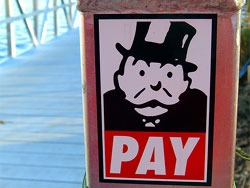
The amount of franchise fee charged doesn’t always constitute a good franchise organisation. A relatively unknown franchise can charge you a hefty amount of franchise fee, while a well-known franchise can charge you below the less-known franchises.
This article offers you a simple guide to help you identify whether a franchise fee is too much for you (too much can results in cash flow problems and other cash-related problems on your franchise unit later on.)
But first, let’s explore what a franchise fee is.
What is franchise fee?
We could say that franchise fee is what defines a franchise. A franchise that claims it doesn’t charge any franchise fee is not a franchise – It is a business opportunities.
Franchise fee, in essence, is a certain amount of fee (usually as a percentage of sales or profit) paid by a franchisee to a franchisor in exchange for the rights to use the franchisor’s brand name, system and support/assistance during the agreed term stated in the franchise agreement, that usually lasts for 5 years.
How much is too much?
It’s difficult to say whether a franchise fee is “right” or not. 5 percent of gross sales can be reasonable in a franchise, but too much in another. The key is to know the typical profit margins for products or services offered by franchisors and the industry they are in, as well as the franchisors’ brand names strength to justify the franchise fee.
Here are some tips to identify whether a franchisor’s franchise fee is too much or not, regardless of what they pitch you:
- “We will support you all the way” is not enough
You need to know the support/assistance details of what you will receive in exchange for the franchise fee. If the projected franchise fee amount is justifiable considering the level of support/assistance you receive, they move on. Also, make sure that the level of support is maintained, if not improved, during the term of the franchise agreement. - “Our brand name is strong” is not enough to justify the franchise fee
McDonalds can charge a large amount of franchise fee, thanks to the brand name known worldwide, on premium locations. But for the rest of the franchises, as an investor you need to know the quantifiable properties of “strong.” Do they have brand awareness rating surveys data? What’s their annual marketing budget? - “We expand rapidly” is not enough
Rapid expansion doesn’t always define a good franchise and justify the franchise fee amount. A franchise can grow too quickly that the franchise organisation doesn’t have strong fundamental – When things gone bad, it could brittle easily. - “We are planning to grow exponentially…” is not enough
Plan is just a plan. You need to inquire the latest improvements and achievements a franchise has to learn whether things go well as planned. We can’t simply agreed on a franchise fee that is set based on future plan. - “We will raise our franchise fee soon…” is not enough
This is a “sense of urgency” type of pitch. You need not to respond to this and stay away from the franchise, because it seems that the franchisor’s primary intention is to close more sales, instead of offering a win-win business proposition for both the franchisee and franchisor.
Ivan widjaya
Justifying franchise fees
Image by walknboston.
